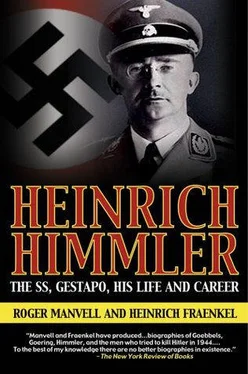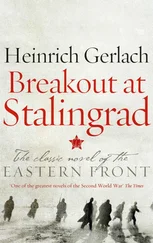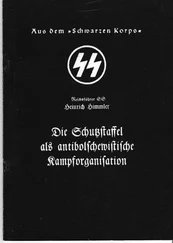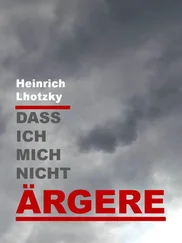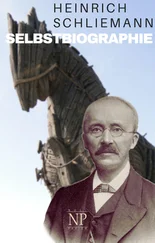Meanwhile Kersten, who still had Finnish nationality, had moved with his family to Stockholm at the end of September 1943, where he was introduced to an American, Abram Stevens Hewitt, who was visiting Sweden as a special envoy from Roosevelt. Kersten soon found that Hewitt, who had become his patient, shared his view that the war should be brought to an end as soon as possible through peace negotiations, more especially as the threat from Russia was becoming so strong. Kersten offered to discuss the matter with Himmler, and on 24 October sent him a letter through the Finnish diplomatic bag.
Kersten began his letter by saying it concerned ‘proposals which might have the greatest significance for Germany, for Europe, even for the entire world. What I offer is the possibility of an honourable peace.’ He then went on to describe Hewitt’s influential position with the American Government and the proposals for peace talks that Hewitt considered possible, but depending on conditions which were very drastic and included the abolition of Hitler’s dictatorship and the Nazi Party and the appearance of the leading Nazis before a court to answer for their war crimes. ‘I beg you not to throw this letter into your wastepaper basket, Herr Reichsführer,’ he wrote, ‘but receive it with the humanity which resides in the heart of Heinrich Himmler.’ He suggested that Schellenberg be sent to Stockholm to meet Hewitt. In every paragraph he appealed to Himmler’s vanity, and concluded with the challenge: ‘Fate and history itself have placed it in your hands to bring an end to this terrible war.’
Kersten was also involved in encouraging the Finnish Government to retire from the war, in which they had become the unwilling allies of Nazi Germany because of their struggle with Russia. After a short period in Helsinki, Kersten returned to Stockholm, where he anxiously waited for some reply from Himmler. Schellenberg arrived in Stockholm on 9 November and met Hewitt with whom, according to Kersten, he got on well. 21But, as usual, nothing happened when Himmler was pressed to take action.
Kersten met Himmler on 4 December at Hochwaldt, his headquarters in East Prussia. He pressed him for a decision. ‘Don’t torment me’, he reports Himmler as saying, ‘give me time. I can’t get rid of the Führer, to whom I owe everything.’
Kersten played every trick he knew to inflate Himmler’s vanity as ‘a great Germanic leader’.
‘In Stockholm Mr Hewitt is waiting for your decision’, he said, ‘so that he can take it to Roosevelt.’
Himmler found the conditions for the peace talks ‘hair-raising’. He could not conceive of a Germany without the Nazi regime.
‘How can I take the responsibility,’ he said, ‘when faced with the leaders of the Party?’
‘You will have no responsibility towards them’, Kersten pointed out. ‘They will have ceased to exist.’
Himmler seemed most perturbed about the suggestion that there must be a court to try those responsible for war crimes, since he knew that the annihilation of the Jews was necessarily regarded by the Allies as the worst of the many crimes the Nazis had committed. This was not a crime at all, Himmler argued to Kersten, since it was decreed by law.
‘The Führer ordered the annihilation of the Jews in Breslau in 1941. The Führer’s orders are the supreme law in Germany. I’ve never acted on my own initiative; I’ve only carried out the Führer’s orders. So neither I nor the S.S. can accept any responsibility.’
The removal of Hitler he regarded as ‘cutting the ground from under my own feet’; the withdrawal of the German Army was an invitation to Russia or America to dominate Europe.
In the end he avoided making any decision by saying he was too tired to think. He agreed, however, that the war should be stopped, but that the conditions suggested by Hewitt were very hard.
‘Your proposals aren’t unacceptable to me,’ he said, according to Kersten, ‘except for the one about responsibility for alleged war crimes.’
In subsequent discussions on 9 and 13 December, Kersten claims that he went on pressing Himmler to make up his mind. He argued that Hitler was a sick man whose orders were bringing Europe nearer and nearer disaster. Eventually Himmler agreed to send Schellenberg to Stockholm to bring Hewitt secretly into Germany to discuss the negotiations with him.
But by the time Schellenberg eventually reached Stockholm, the time-limit for discussions set by Hewitt had elapsed; he had gone back to America. A remote chance to bring about peace had been thrown away; how far deliberately, how far through Himmler’s chronic procrastination it is now impossible to determine.
During 1943 Himmler began to extend his military ambitions. The fall of Stalingrad followed by reverses in North Africa led Hitler to revoke his ban on the expansion of the Waffen S.S. His total losses in Russia and Africa amounted to over half a million men. After Khahov was recaptured by the Germans in the spring, Himmler, as we have seen, spoke there in the University about the foreign recruits his S.S. men would soon find fighting beside them. Eight new divisions were formed during 1943, half of them recruited from East Europeans of whom by no means all were of German racial origin. All Rumanians of German origin were subject to conscription, to the resentment of the Rumanian Army; many of them were sent to replenish S.S. divisions elsewhere in Europe, where they were not popular. Even Bosnian Moslems were recruited, and in May Himmler made the Mufti Hajji Iman an honorary S.S. Lieutenant-General. Obviously all former S.S. standards had gone by the board, and in the same month recruitment began for an S.S. division made up of anti-Bolshevist Ukrainians, who formed part of the vast body of men numbering over half a million who had been former subjects of the Soviet Union and whom the Germans persuaded to serve in their own armies. Himmler still endeavoured to maintain his racial prejudice in the face of this rapid expansion of his forces, since he regarded all Slavs as inferior, but he welcomed into his ranks the Asiatic stock he associated with Genghis Khan. Other divisions were formed in Latvia and Estonia. By the end of the war, the number of S.S. divisions was to increase to thirty-five, representing some half a million fighting men. Allowing for losses, the numbers involved were some 900,000; of these less than half came from Germany itself, and some 150,000 were men whose racial origins were not Germanic. 22
Although the eight months from January to 25 August 1943, when Himmler became Reich Minister of the Interior following the downfall of Mussolini and the defection of Italy, represent a period during which he had to regain the confidence of Hitler after the misunderstanding over the escape of Horia Sima — ‘a considerable time’, says Schellenberg — they were months in which Himmler’s powers outside Hitler’s court considerably increased. Although, according to Reitlinger, Himmler had no direct access to Hitler, who was spending the greater part of his time at his Wolf’s Lair headquarters at Rastenburg, this does not mean he was out of touch with him. There was, however, a continuous struggle between him and Bormann for influence over Hitler, though each of them knew better than to bring the fight into the open. According to Schellenberg, who hated Bormann — ‘the contrast between him and Himmler is really grotesque; if I thought of Himmler as a stork in a lily-pond, Bormann seemed to me like a pig in a potato-field’ — Himmler made many tactical errors in his dealings with Bormann, which the latter merely exploited at Himmler’s expense; one of these errors was the secret loan through Bormann of 80,000 marks from Party funds to help provide for the needs of his mistress Hedwig and their children.
Читать дальше
